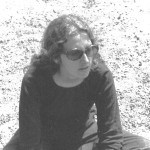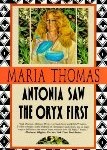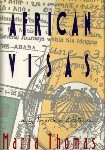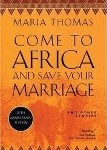Remembering Maria Thomas: A Conversation with Her Son, Raphael Worrick
THE PEACE CORPS WRITERS’ MARIA THOMAS FICTION AWARD is named after the novelist Maria Thomas [Roberta Worrick (Ethiopia 1971–73)] who was the author of a well-reviewed novel, Antonia Saw the Oryx First, and two collections of short stories — Come to Africa and Save Your Marriage and Other Stories and African Visas: A Novella and Stories — all set in Africa. Roberta and Tom Worrick were married with a young son when they went to Ethiopia as a married couple with the Peace Corps. After their tour, they continued to live and work in Africa.
In addition to her life as a wife, mother, and PCV, Roberta Worrick was a wonderful writer. Her stories appeared in Redbook, Story and The New Yorker. She was a Wallace E. Stegner Fellow and received an Overseas Press Club’s commendation for reportage in Harper’s. She was coming into her own as a literary figure when her life was cut short.
Roberta was only 47 when she was killed on August 7, 1989, in a plane crash near Gambela, in western Ethiopia. She was working as a translator and traveling with her husband, Tom Worrick, who at the time was the Deputy Director of USAID in Addis Ababa. Roberta and Tom went down in the crash that also killed Congressman Mickey Leland of Texas. They were on their way to inspect a famine distribution center. A total of sixteen people lost their lives on that flight.
Recently I have been in touch with their son, Raphael, who has been kind enough to talk about his mother and being a “Peace Corps kid” in Ethiopia when his parents were PCVs.
•
Raphael, thank you for sharing stories about your life and your parents. Many PCVs and RPCVs have read your mother’s writings with a great deal of pleasure, especially those of us who were also in the Peace Corps in Ethiopia.
Happy to talk about “Maria Thomas” or as I should say, “Mom.”
.
Do you know how and where your parents met? Was it in school?
My parents knew each other since elementary school in Hingham, which is on the South Shore of Boston. My grandmother always claimed that my mother announced she was going to marry my dad promptly after meeting him in 4th or 5th grade, but her stories were sometimes slightly embellished.
.
Where were you living before you went into the Peace Corps?
We lived in Vermont, New Mexico and Pennsylvania before we went overseas. My mother got her BA at Mt. Holyoke and my dad did an associate’s degree in Agriculture at UMass Amherst. After college mom spent a year in Florence studying painting, and they got married after that. They worked at the Mountain School in Vershire, Vermont for a couple of years, which is when I was born. My mom was teaching English and my dad was managing the student farm. We moved to Las Cruces when I was about 2, and again my mom taught English while my dad completed his bachelor’s in Ag Econ. They then both attended Penn State for graduate school.
Did you ever get a sense of why they went into the Peace Corps?
After grad school they wanted to go overseas, particularly somewhere in South America since they both had learned Spanish while in New Mexico. Like any good bureaucracy the Peace Corps sent them to Ethiopia.
.
When they were in the Peace Corps, did both of them teach?
No. Dad worked at the Ministry of Agriculture in Addis. My mom taught English, though I’m not entirely sure of the specifics on where and to whom.
.
Where did you live in Addis?
We lived in a house not too far from Arat Kilo, I think. We had a larger house than a lot of the Volunteers since it was for a married couple and child. Because we had more space it turned into something of a Volunteer hangout. I went to the elementary school run by Princess Sofia, the emperor’s granddaughter. It was up at the top of the famous seventy steps, which I remember running up and down.
.
After the Peace Corps where did you go?
After the Peace Corps my dad worked for USAID as an Ag Economist. He worked on development projects as well as (frequently) famine relief. Our first post after the Peace Corps was Nigeria, followed by Tanzania, Pakistan, and Kenya, which is where I finished high school.
.
What was your father like?
My dad was a pretty reserved person most of the time. While he didn’t come from a farm family he grew up working on area farms and really identified with people working in agriculture. He was the sort of person who I think seemed pretty standoffish to people who didn’t know him, but was tremendously warm and funny with people he knew.
.
Are you more like your mother or father?
I’m a pretty good mix of them, I think. I have my father’s interest in the practicalities of the world, and a lot of his somewhat crusty exterior. I got the curse of creativity from my mother!
.
What about you. What was it like to grow up going to school in Africa?
It was a great experience. Generally the post-independence countries in Africa were pretty safe places and we had a lot of freedom as kids to wander around and explore. Of course there were the occasional sketchy incidents, but for the most part it was a pretty amazing ride. The schools I attended were pretty variable in quality, but a lot of the education came from just the day to day experience of living abroad. We did have a smattering of great teachers though.
It also meant we ended up with friends scattered all over the world, which makes it nice (and less expensive) to visit those places.
.
Where is your wife from? You said you met when you were in school overseas.
My wife is Canadian. Her dad worked for CIDA, the Canadian aid agency. When we met he was working at a technical teachers college in Nairobi, coordinating education for vocational teachers.
.
What did you do after high school?
After finishing high school in Kenya I attended Wesleyan in CT, and then got a masters in film production from York University in Toronto. I worked in the film business in Toronto for a few years as a set carpenter. We moved to Vermont in 1996 when my wife got a job here. She works in international development and education.
.
You made a second trip back to Addis . . . when was that?
I visited Ethiopia in 1988 for about a month when my parents were stationed there with USAID. I had just graduated from college. At that the point the city was already vastly expanded from how I remembered it, and the overpopulation and deforestation was very noticeable. Of course this was also during the Mengistu regime, after the worst of the famine and forced relocations, and the political mood in the country was very dark. We were able to travel somewhat to the north, but movement was fairly constrained. The hospitality and humor of the populace was amazingly resilient though.
.
Raphael, have you read your mother’s fiction?
Yes, although not for a while — I’m due for a re-read. I think I like Antonia Saw The Oryx First best, for the fullness of it. She didn’t like that title very much. It was actually submitted under the title African Visas which was later used for the second story collection.
.
Was her writing a “big thing” in your family?
Certainly in the later years it was. She actually wrote for many, many years with very little recognition. She had a number of stories published in small literary magazines, but I think it was around 15 years from when she started submitting material until she secured a publisher.
.
Have you read any Peace Corps writers (besides your mother)?
Yes, Paul Theroux (Malawi 1963-65) and Roland Merullo (Micronesia 1979-80) (oddly enough my maternal grandmother grew up in Revere, Roland’s hometown), and others. I’ve forgotten the names of them. Names aren’t my strong suit.
.
Do you have any knowledge of why both of your parents were on that plane that crashed?
My father’s work for USAID in Ethiopia involved coordination of famine relief. They were travelling with the congressional delegation to look at a food distribution site. My mother worked on contract as a translator — she was very good with languages and spoke excellent Amharic.
.
Where were you when you heard the news about the crash and you learned that you had lost your parents?
We were living in DC at the time, in a house my parents had bought that I was renovating.
.
You say you are a free lance carpenter now?
Yes, I do both house renovation and custom furniture work. I’m also a musician although that doesn’t pay any bills.
.
One final question, if you don’t mine: have you thought of writing yourself?
I’ve written lots of songs. You can find them online if you look up the Dirtminers, The Plastic Billionaires, and/or Mr. Ray Fork. It’s possible I might get motivated to write something longer someday, but I haven’t given it a lot of thought really.
.
Thank you, Raphael, for sharing some of your family history with us.
Thank you, John and Marian, for naming your fiction award after my Mom. It’s a real nice feeling to see her name in print and on the web and know she is being remembered by you and all the Peace Corps writers.
•
To purchase any of Maria Thomas’s books from Amazon.com, click on the book cover or the bold book title — and Peace Corps Worldwide, an Amazon Associate, will receive a small remittance that will help support our annual writers awards.

This was lovely. Thank you for letting us know more about Maria.
I love this interview. Well done all. Ed
I have all of Maria Thomas’ books. And have read excerpts several times to friends, even to myself. I’ve known about her life and her sad demise for a long time, and I think I’ve even read an interview with Raphael in years past. What an awful shock for the son of such brilliant, loving parents. Maria Thomas will always remain a mentor, inspiration and beautiful spirit in my life that I have shared with many others. Thank you, Raphae. Thank you, John.
I have all of Maria Thomas’ books. And have read excerpts several times to friends, and often to myself. I’ve known about her life and her sad demise for a long time, and I think I’ve even read an interview with Raphael in years past. What an awful shock for the son of such brilliant, loving parents. Maria Thomas will always remain a mentor, inspiration and beautiful spirit in my life that I have shared with many others. Thank you, Raphael. Thank you, John.